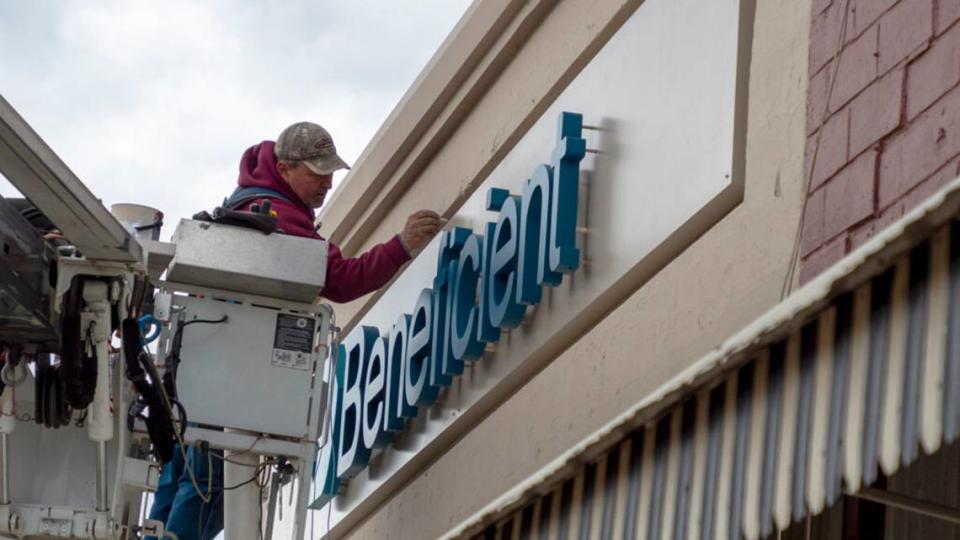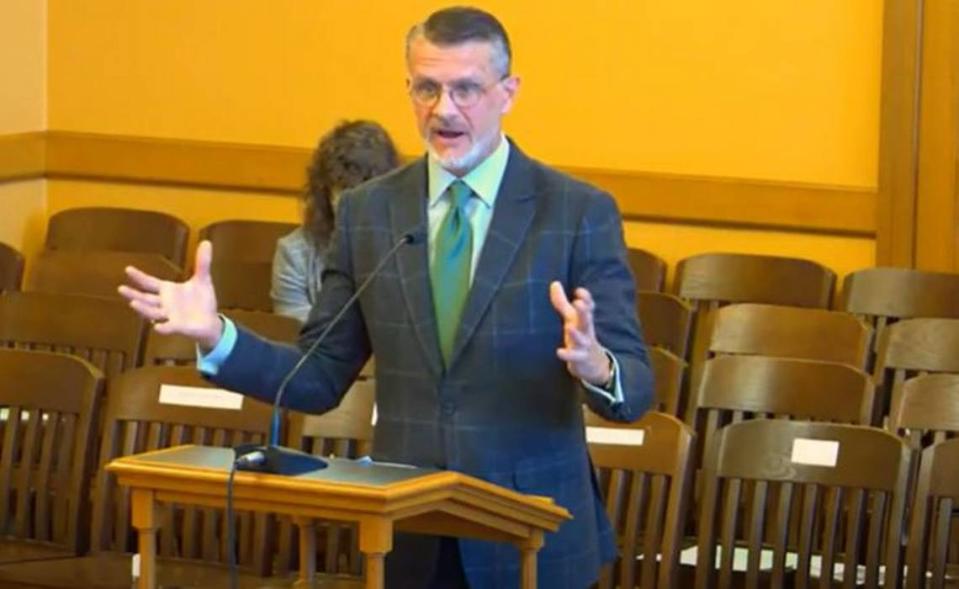Again and again, Kansas politicians show their top priority: Making the rich richer | Opinion
In years to come, the case of Brad Heppner and his cynical notion of a “pawn shop for the rich” may come to epitomize the avaricious bipartisan recklessness with which our Kansas politicians have catered to the powerful at the expense of everyone else.
Now that the Securities and Exchange Commission is breathing hard down Heppner’s neck, according to recent reporting by The Wall Street Journal, there may finally be a reckoning for the Kansas experiment in alternative banking. But it won’t stop the moral weakness and intellectual stupor of politicians who give such schemes the blessing of legislation.
From Heppner’s “alternative assets” lending company Beneficient to the adoption of statewide sports betting to the secret deal for a Panasonic battery plant at De Soto, our lawmakers and state officials have catered to influence. The magic phrase in the Kansas Statehouse is “economic development” and it opens every door. This has resulted in a kind of economic Darwinism in which only the richest and best-connected survive while the vulnerable are left to the beasts.
Our legislators can’t agree to defend our trans kids or expand Medicaid or embrace scientifically proven medical advice, but they will go to extraordinary lengths to serve the rapacious monied. Old-fashioned ideas like social justice or economic equality or basic human rights gain no traction in the marbled halls in Topeka, but let a self-styled rainmaker come knocking and our elected officials on both sides of the aisle will fall all over themselves trying to please.
The Legislature literally rewrote banking laws to allow Heppner’s company, Beneficient, to open shop in his hometown of Hesston. The firm loans money on traditionally illiquid assets, such as a hedge fund or an expensive antique instrument, to individuals with a typical net worth of at least $5 million. This was authorized by the 2021 TEFFI Act, passed by a near-unanimous vote. TEFFI is a silly acronym that stands for “technology-enabled fiduciary financial institution,” which sounds important but is essentially without meaning. What financial institution today doesn’t use technology?

Bring back grocery store to small rural town?
From the start, the Kansas bank commissioner had concerns over the charter for Beneficient and the lack of regulation in the act. But the promise of rural economic development grants, funded by a percentage of the TEFFI transactions, was too good to pass up. What risk could there be to Kansans when most of Beneficient’s customers would be well-heeled out-of-staters?
Heppner even told a story about how his mother, who still lives in Hesston, had appealed to him to bring a grocery store to town, because that last one had closed a few years before. Heppner vowed to bring a grocery store back through the economic development money his vision would generate.
But reporting by The Wall Street Journal underscores concerns over a $2 billion default of a former Heppner-helmed company, some allegedly faulty accounting, and a stock price that has plummeted 85% since Beneficient merged with another firm and went public a few weeks ago.
Creditors of a failed past company, GWG Holdings, alleged in federal bankruptcy filings that Heppner was engaged in a “classic Ponzi scheme” to suck $350 million from the sale of bonds held by GWG to bankroll Beneficient. Attorneys for Beneficient denied the allegation.
While Kansas was forging the act that would allow the first-ever TEFFI to open for business, millions of dollars were flowing from Beneficient to Heppner-related entities, according to The Wall Street Journal. This included $157 million to HCLP Nominees, a financial trust; $14 million to Bradley Capital, to pay for a private jet used for personal travel by Heppner; and $3 million to an endowment related to Heppner’s Bradley Oaks Ranch in tiny Bradford, Texas. These payments were made between 2019 and March 2023, the Journal reported. A Beneficient spokesman told the Journal the transactions were legal and properly disclosed.
Since 2020, the SEC has been investigating Heppner’s companies. Last month, the SEC sent separate “Wells Notice” letters to Heppner and Beneficient warning of possible civil enforcement of alleged securities violations. Heppner and his company responded to the SEC by saying their actions had been appropriate, according to the Journal article.
We’ll see. Things can be legal but still be morally bankrupt.

Secret De Soto Panasonic deal bested by Oklahoma
Back in April of last year, when Beneficient was putting finishing touches on its offices in Hesston, I was skeptical of the “pawn shop for the rich” plan. The developments since then have made me downright disgusted. In June, Beneficient went public in a $3.3 billion merger with Avalon Acquisition Inc., with an opening share price of $9. As of Monday, the stock had sunk to $1.96 per share.
Add to that the Chapter 11 bankruptcy of GWG, the lawsuits by investors, the flow of money to Heppner entities, the inscrutable nature of Beneficient’s business and what appears to be the SEC signaling a wrap-up of its investigation, and it all amounts to a troubling yet unsurprising turn of events. The state of Kansas should have known better than to endorse this kind of speculative and frankly grubby business model.
Yet, it is part of an alarming trend of blindly seeking economic development with no regard to unintended negative consequences. Economic policy is not a thought experiment in which you must decide whether to kill theoretical victims to save others from a runaway trolley. Instead, state policy has become the runaway trolley, and living and breathing Kansans are likely to suffer from unimagined consequences.
I was one of only a few columnists in Kansas to be wary of the Panasonic deal, in which lawmakers weren’t even told the identity of the private sector mystery firm before being asked to vote to give it $1 billion in tax breaks and other incentives. The deal was broadly hailed as a shrewd move for Kansas, one in which we beat out Oklahoma for the $4 billion Panasonic plant. But surprise! In April it was announced that Panasonic had struck a deal for another, bigger ($5 billion) plant to be built at Pryor, Oklahoma, with fewer state subsidies.
To make matters worse, the electric utility Evergy has said it will seek a rate hike to pay for the infrastructure needed to power the De Soto plant. This is on top of a request to raise rates by 24.9% in an area that stretches from Wichita to northeast Kansas. Imagine you’re one of the Kansans hit with the hidden tax of an electric rate increase for the Panasonic plant. Would you think the deal, hatched in secret and eventually bested by Oklahoma, would be of any benefit to you or your family?
Incentives, sports betting are not conservative policy
There is something wrong with economic policy in Kansas and it has largely to do with deference to so-called business interests, but that’s not all of it. There’s also been a fundamental shift in the Legislature and state government, including the governor’s office, away from the sense of moral duty and fiscal conservatism that was a hallmark of Kansas politics for decades. We didn’t used to throw money and law at crazy schemes. There was a time when the idea of making sports betting legal in Kansas would have been met with shock. A pawn shop for the rich? That would have been laughable. Not so long ago, ideas drove the political conversation, in Kansas and the nation, instead of influence, opportunism and hucksterism.
Louis Menand, in 2001’s “The Metaphysical Club: A Story of Ideas in America,” writes about how modern America was born in the explosion of thought in the generation following the Civil War. Kansas was part of that transformation, having been born during the war and inheriting such progressive ideas as the founding of public universities and the use of government as the instrument of positive social and economic change. The goal was not greed, but advancement of the common good.
A similar period, I believe, followed World War II, when our ideas were informed by the evils of fascism, the horrors of the death camps and the knowledge that we had created the technological means to finally extinguish ourselves as a species. Our parents and grandparents shaped a world, however imperfectly, that drew a clear line distinguishing between the uses and the abuses of economic and political power.
But now we seem to be caught with no ideas to propel us forward.
Instead we have schemes to increase the wealth and power of a few at the expense of the many. Novel pawn shops and online sports betting and billion-dollar gifts to multinational conglomerates do little to advance the lives of ordinary, flesh-and-blood Kansans. What we need are the kinds of ideas that in past generations made us better, spiritually richer people — through opportunity, through education and through the constant struggle for justice and equality for even the least among us.
Before he served as a Supreme Court justice, Louis D. Brandeis said: “We can have democracy in this country or we can have great wealth concentrated in the hands of the few, but we can’t have both.”
Oh, and that grocery store Heppner promised for Hesston? It hasn’t happened yet.
Max McCoy is an award-winning author and journalist. A native Kansan, he started his career at the Pittsburg Morning Sun and was soon writing for national magazines. His investigative stories on unsolved murders, serial killers and hate groups earned him first-place awards from the Associated Press Managing Editors and other organizations.

